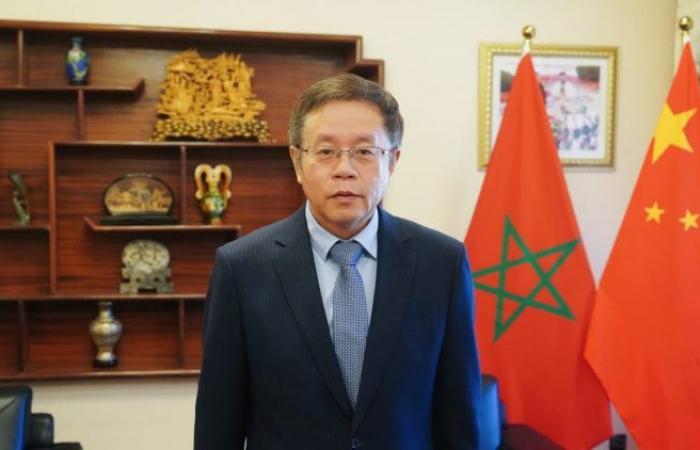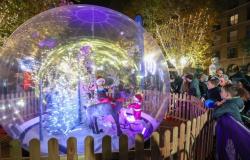Par LI Changlin
Morocco is known as the “ North African garden
» for the beauty of its landscapes. Moroccans are gentle, open-minded and hospitable, especially towards foreigners. Thanks to my work, I made many friends from all walks of life in Morocco, and I had the opportunity to be invited to their homes to discover up close the art of welcoming Moroccans.
The way Moroccans welcome their guests is a real ritual and makes you feel at home. Moroccans are punctual. Officials and friends I met never missed their appointments; they always waited for me at the entrance to their office or home and accompanied me to my car at the end of the meeting. Moroccans are also generous, and even soon after we get to know each other, you are invited to their home for tea or a meal. The host in traditional djellaba costume waits for his guests of honor at the door, and offers them dates and milk. When Chinese President Xi Jinping was in transit in Casablanca a month ago, he tasted dates before entering the airport’s royal lounge, with Crown Prince Moulay El Hassan.
Many of my Moroccan friends told me that they saw this touching image on television, and were deeply impressed by President Xi Jinping’s attention to the country’s traditional customs. When you subsequently enter the residence, you often see a professional waiter invited by the host, dressed in a uniform, wearing white gloves, standing in a corner of the living room, ready to serve guests. On the living room table are various drinks, candied fruits and pastries, including gazelle horns with almonds, briouates with honey and almonds, ghribas with walnuts, makrouds with dates, and mhanchas with almonds, etc. A small orchestra plays in the living room and a singer intervenes. On the floor, in a corner of the living room, sits a tea maker, dressed in traditional clothing, with small pots of herbs in front of him, similar to Chinese herbs. He puts the herbs of your choice in the hot tea, and he says that each of these herbs has its therapeutic benefits, some helping to relieve blood pressure, others stimulating digestion or restoring energy.
Drinking Chinese green tea is the focus of my conversations with my Moroccan friends, and they say that drinking Chinese green tea every day is essential, joking that half of their body is made of green tea. They particularly emphasize that the utensils used to prepare tea in Morocco are called Siniya (meaning “Chinese objects” in Arabic), and I also tell them that Morocco is the largest importer of green tea from China. , with an annual volume of approximately 70,000 tons, and that green tea has played an exceptional role in bringing the Chinese and Moroccan people together.
Moroccan houses are spacious, functional and have a strong cultural component. The city of Rabat where I live, the municipality stipulates that residents must not build more than two floors, namely a basement, an upper floor and a ground floor. Most of the families I visited belong to civil servants or businessmen. Upon entering the home, the host guides guests through the layout of the residence. What caught my attention was that the surface area of the residence is impressive, but the front door is small, which gives it a particularly discreet appearance. There are at least two or three living rooms of different sizes in the house, and one of them has to be a traditional-style round living room, with sofas placed against all four walls.
The owner explained to me that one of the important functions of the living room is that children come to the house during vacations or parties, and they can sleep in this large living room at night. What is also impressive is that in most houses one can see objects bearing Chinese elements, such as screens, vases, cutlery, miniature terracotta warriors, etc., and the hosts would tell you stories related to these Chinese cultural ornaments. Almost all residences of this type have a large lawn in front or behind the house and also a swimming pool. Most of these houses belong to elderly parents who bought the land 20 or 30 years ago, when land was cheaper, and finished building them within 3 or 4 years. When I walk around the neighborhood in the evening, I sometimes see a family setting up tents in their yard, and when I inquire, I learn that they are having a wedding for their child on Saturday evening, because only the parents’ house has the space needed for an event of this scale.
Moroccan cuisine is rich and particular. Moroccans are proud to say that their cuisine is the third in the world after that of the Chinese and the French. During short-term trips to Morocco, Chinese people will always try Moroccan cuisine, and are often impressed by the variety and quantity of foods that suit their tastes well. I’ve noticed that Moroccans who entertain guests for dinner more often choose the round table, and they say that everyone sitting together will create a better atmosphere. Moroccan salads will be served first, and they consist mainly of eggplant, carrots, pumpkin and tomatoes. Next comes the pastilla, either savory with shrimp, squid and other seafood, or sweet, stuffed with pigeon or chicken, with onions, lemon, eggs and toasted almonds.
Mechoui means whole mutton or lamb roasted on a spit, tender and crispy, with salt and cumin as a sauce. Tagine is very similar to the cuisine of North-East China. Its most common varieties are beef tagine with plums, chicken tagine with lemon and olives, and fish tagine. Let’s not forget the couscous, with lamb, mechoui, or even purely vegetarian. It is usually accompanied by a selection of seven vegetables, including pumpkin, potatoes and turnips. Normally, the family has couscous together on Fridays after prayers.
Among the soups, harira is the most famous. It is a soup similar to Chinese Consommé, made with beef or lamb, tomatoes, onions and chickpeas, flavored with coriander and saffron for a sweet and sour taste. Not long ago, ten classmates from my class came to visit Morocco, and I took them to see the President of the Prefectural Council of Rabat, Mr. Abdelaziz Derouiche, and the President of the Morocco-China Chamber of Commerce, Mr. Ahmed El Makkaoui, to make them taste delicious Moroccan cuisine. These two Moroccan friends prepared a whole range of traditional dishes, and their kindness and generosity really touched my classmates.
The exchange of gifts is very appreciated by Moroccans, who see it as an important way of transmitting their friendship. According to Moroccan custom, the first time you go to someone’s house, you are advised to bring a gift. It can be a traditional craft object, a dessert, a bouquet of flowers, books or illustrated magazines. If you are invited to a wedding, it will be ideal to bring something symbolic of your country. Some time ago, I met a Moroccan chocolatier, Mr. El Yacoubi, in Casablanca. As we got along very well, we quickly became close friends and he regularly sends me a box of chocolates, which I share each time with my colleagues. It is worth mentioning that almost every year, for my birthday, my driver Mohamed gives me a gift, a traditional djellaba, framed photos of me participating in an event… And of course, I give him Chinese gifts in return as a token of recognition.
At the same time, Moroccans know how to express their gratitude by always responding friendly to the help of others. It is not uncommon for Moroccans to offer medals or certificates of merit to show their gratitude and print photos and the names of the participants on them. Recently, the Royal Moroccan Wushu Federation, the Grande Ismaïlia Association of Meknes and the Mandarin Chinese Center of Marrakech offered me medals and trophies to thank the Chinese side for having contributed to the organization of the Wushu Competition. Wushu and the International Tourism Forum and for providing materials to the Mandarin Chinese Center.
Last year, Chinese President Xi Jinping, in his speech to Chinese ambassadors accredited abroad, asked us to establish deep friendships with the country where we work, and that our task should be carried out both at the official and popular level. During his meeting with Crown Prince Moulay El Hassan in Casablanca, President Xi stressed that China and Morocco should further develop cultural exchanges and continuously strengthen our friendship. In my opinion, the best way to implement this spirit is to proactively make more friends from all walks of life, visit more Moroccan families, and understand the country better. Next January, China Eastern Airlines will inaugurate the Shanghai – Marseille – Casablanca route and Royal Air Maroc will resume Casablanca – Beijing flights. Therefore, people-to-people exchanges between China and Morocco can be expected to enter a period of rapid growth, which I believe will lay a solid foundation for comprehensive cooperation between our two countries.






